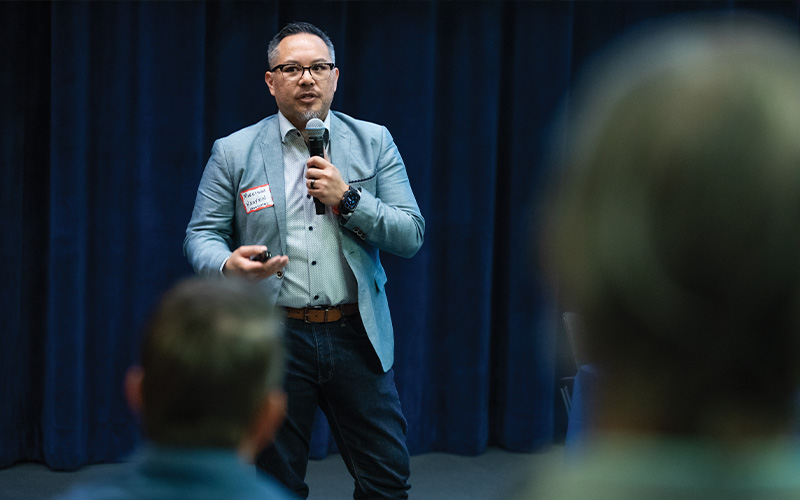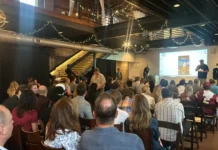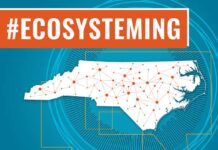
The life science industry is thriving these days in the Wilmington area, professionals in the field said at a recent event.
Nearly 300 people from 15 states gathered in downtown Wilmington at the third annual Investor Buzz In at the Beach event, held May 16 at Cape Fear Community College’s Union Station. The event, hosted by the Network for Entrepreneurs in Wilmington (NEW), connected investors and entrepreneurs, along with highlighting local trends.
During the session, Is there LIFE in the Life Sciences Industry at the Coast?, panel members from a variety of sectors discussed the local growth of the industry.
Stephen Perry, CEO of Kymanox, introduced the panelists and pointed to a “renaissance period” for the life sciences industry in Wilmington.
“Right now, we have the strongest science I’ve ever seen. I am a chemical engineer, and I pride myself on understanding the underlying technologies for new drugs, biologics and combination products; however, I struggle to stay abreast of all the new science that is being leveraged to improve the human condition. I am humbled by how far and fast science is going right now,” said Perry, whose firm provides life sciences consulting services.
Rob Cooley, CEO and co-founder of Wilmington-based neuroscience company Nuream, spoke about how the dynamic atmosphere of Wilmington makes it “the right spot,” but encouraged cohesion among all parties to ensure its success.
“We want a rising tide to rise because it helps everybody,” Cooley said. “Wilmington has a lot of what we need (but we) just need everyone in the same rowboat rowing together.”
Morris Nguyen, Predicate HPG CEO, agreed that Wilmington is the perfect size to build an ecosystem for the life sciences.
“Wilmington is not too much, not too little; it is just right. It has huge opportunity,” Nguyen said.
Nguyen added that every founder needs support and emphasized the need for external capital for the life sciences.
Ed Field of Cape Fear BioCapital explained that North Carolina is in the top five states for biomanufacturing, but said the state is not good at early-stage innovation.
“The thesis is all the elements are in place; the talent is unbelievable, the labs, the infrastructure and service providers are exceptional, but we lack early-stage capital,” Field said.
Field added that since September, there have been 140 companies who have come to his capital firm, all from North Carolina, but so far, they have only written two checks.
“We are focusing on what is world-class,” Field said. “These two are people doing what we believe are the best in the world. There is a lot of activity. As we look at entrepreneurs from a technical perspective, we want them to be dependable and unique.”
Nguyen, a medical doctor and an entrepreneur, shared his vision for what he believes will lead to success in the industry.
“I see anything biological as the future of life sciences: biological and digital – from molecules to multimodal data,” Nguyen said.
Local companies like DuraVax are fueling the fires for the life sciences in the Wilmington area. Working to provide longer shelf lives for mRNA pharmaceuticals to allow for more global access, the startup has received significant funding from the University of North Carolina Wilmington, the National Science Foundation and the NC Biotechnology Center.
“Wilmington is one of the most vibrant communities of entrepreneurship in the country,” said Yin Wang, associate professor of chemistry at UNCW and one of the founders of DuraVax. “UNCW has provided support to incubate advances in sciences and innovations. And state funding agencies such as NC Biotech Center and NCInnovation have provided essential funding and business training to help scientists move their innovation outside the lab.”
Cooley discussed how eventually, prescriptions will be tailored to the individual, and he foresees the cost of precision therapeutics becoming more affordable.
“We are not quite there yet, but we have opportunities to combine there and create pharmaceuticals tailored to individuals and demographics. The use of science makes this more than possible, and it is being done right now,” Cooley said.
Cooley encouraged entrepreneurs to do their homework, and Nguyen emphasized that “science is easy, relative to the entrepreneurial stuff.”
“There is a boom in facilities,” Perry said. “New plants are being built, expanded and remodeled to the tune of tens of billions of dollars across the USA and here in North Carolina. I have never seen this level of CapEx (capital expenditure) investment in my 30-year career.”
Cooley said, “Life science is broad, but it is big, and it is growing.”
For example, life science companies won the Coastal Entrepreneur of the Year award, presented by the Greater Wilmington Business Journal, last year and this year.
Predicate earned the award in 2024 while Frontier Scientific Solutions received the honor for 2025. A temperature-controlled storage and transportation firm serving the pharmaceutical supply chain, Frontier in November announced plans to develop state-of-the-art facilities at Wilmington International Airport and Shannon Airport in County Clare, Ireland.
During the Buzz In at the Beach panel on life sciences, experts also said that while there are significant concerns about funding cuts at the federal level, optimism abounds gbecause of artificial intelligence (AI).
“AI is filling the gap – and then some. Tomorrow’s medicine is coming – and it is being brought to us with the help of AI,” Perry said. “This application of AI is proving to be the biggest (return on investment) for AI investments in life science thus far.”





